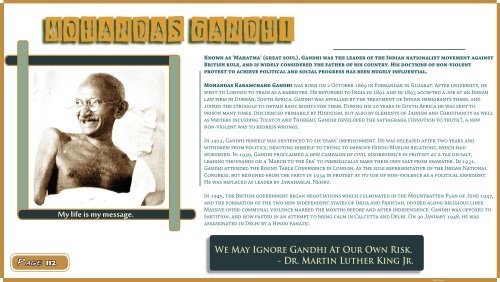Create successful ePaper yourself
Turn your PDF publications into a flip-book with our unique Google optimized e-Paper software.
Mohandas Gandhi<br />
Known as 'Mahatma' (great soul), Gandhi was the leader of the Indian nationalist movement against<br />
British rule, and is widely considered the father of his country. His doctrine of non-violent<br />
protest to achieve political and social progress has been hugely influential.<br />
Mohandas Karamchand Gandhi was born on 2 October 1869 in Porbandar in Gujarat. After university, he<br />
went to London to train as a barrister. He returned to India in 1891 and in 1893 accepted a job at an Indian<br />
law firm in Durban, South Africa. Gandhi was appalled by the treatment of Indian immigrants there, and<br />
joined the struggle to obtain basic rights for them. During his 20 years in South Africa he was sent to<br />
prison many times. Influenced primarily by Hinduism, but also by elements of Jainism and Christianity as well<br />
as writers including Tolstoy and Thoreau, Gandhi developed the satyagraha ('devotion to truth'), a new<br />
non-violent way to redress wrongs.<br />
In 1922, Gandhi himself was sentenced to six years’ imprisonment. He was released after two years and<br />
withdrew from politics, devoting himself to trying to improve Hindu-Muslim relations, which had<br />
worsened. In 1930, Gandhi proclaimed a new campaign of civil disobedience in protest at a tax on salt,<br />
leading thousands on a ‘March to the Sea’ to symbolically make their own salt from seawater. In 1931,<br />
Gandhi attended the Round Table Conference in London, as the sole representative of the Indian National<br />
Congress, but resigned from the party in 1934 in protest at its use of non-violence as a political expedient.<br />
He was replaced as leader by Jawaharlal Nehru.<br />
My life is my message.<br />
In 1945, the British government began negotiations which culminated in the Mountbatten Plan of June 1947,<br />
and the formation of the two new independent states of India and Pakistan, divided along religious lines.<br />
Massive inter-communal violence marred the months before and after independence. Gandhi was opposed to<br />
partition, and now fasted in an attempt to bring calm in Calcutta and Delhi. On 30 January 1948, he was<br />
assassinated in Delhi by a Hindu fanatic.<br />
Page 112<br />
We May Ignore Gandhi At Our Own Risk.<br />
- Dr. Martin Luther King Jr.<br />
Abhi Sharma


